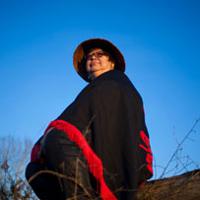In an address this week, the Assembly of First Nations chief encouraged First Nations people to vote in huge numbers on Oct. 19 -- but in the next breath admitted he didn't vote in the last federal election and hasn't decided if he will do so this time around.
Under the advice of his elders, National Chief Perry Bellegarde doesn't vote on the basis that it would be a breach of his nation's treaty relationship. His nation is distinct from the Canadian government. He still urges people to vote even though he may not himself. Interestingly, Bellegarde didn't tell youth to seek the advice of their elders on whether they should vote. He just told them to vote.
There is a lot of talk about the potential power of the aboriginal vote this election. The AFN has identified 51 ridings where First Nations voters could make a big difference. Just this week, the new Mrs. Universe, Ashley Callingbull-Burnham from Alberta's Enoch Cree Nation, called on First Nations people across Canada to vote out the Conservative party this fall.
But for many First Nations people, the question of whether to vote in the election does not have a simple answer. It is not like being a Canadian who is told they have a duty to vote as part of their responsibilities as a citizen.
First Nations people are citizens of their own nations -- nations that have never consented to become a part of Canada. They hold elections for their own chief and council, and in fact voter turnout on reserve is higher than the national average. It's their government, so why wouldn't they vote?
For First Nations with treaties, those treaties were entered into on a nation-to-nation basis. Those treaties did not mean First Nations were to become a part of the Canadian government, but only that the Canadian government and the treaty nations were to live in peaceful co-existence with each maintaining their own governments, lands and resources. It is based on this understanding that treaty people do not vote in another government's election.
Until 1960, First Nations people could not vote in Canadian elections, as they were not Canadian citizens. Then the Canadian government amended the Citizenship Act to ''make'' First Nations people into citizens, without consultation. No one asked if they wanted to become Canadian. This is one reason First Nations people don't vote: they never gave their consent to be Canadian.
Another reason First Nations don't vote in Canadian elections is because it is hard to trust a government of any party that has, for example, implemented the White Paper of 1969, put in place residential schools that have had devastating multigenerational effects, and used paternalistic laws like the Indian Act to hold back First Nations development and messed up who is an Indian. Why would you want to vote for a government that continually imposes legislation and policies that do not provide for the advancement of First Nations?
Other First Nations people don't vote because the Canadian government is so far removed from their lives that they have no hope that things will change. Any attempts to work with members of parliament are often futile and a waste of time -- for example, even one of their own people, Nunavut MP Leona Aglukkaq when she was minister of health, was unable to bring enough affordable food to the Inuit in the north. An APTN documentary showed people in Nunavut scavenging for food from garbage dumps to survive.
Direct participation
In contrast, other First Nations people vote in elections. They feel they need to elect a government that will finally settle outstanding land claims, uphold rights, and seek the consent of First Nations over developments. They feel they are a part of Canada and voting gives them power to choose a government. They encourage other First Nations people to vote, especially in ridings where they can swing the vote.
There are more than 50 aboriginal candidates vying for a seat in Parliament. They represent all parties. They want to make a difference for their people and think they can do so from within. They are going into First Nation communities and telling people about the need to vote and explaining what they can do in government on behalf of First Nations people.
They are trying to convince First Nations that they must vote to change things for the better despite their strong relationship with their nations. It is a hard sell, but can be done as evidenced by First Nation MPs that have been elected such as Willie Littlechild, Ethel Blondin and others.
No doubt Stephen Harper’s Conservative administration has been the worst for First Nations. The assault on First Nation rights and title has been continual. There needs to be change. There needs to be progress, and this will never happen under another term with Harper. First Nations people may or may not vote in this election and they all have their own reasons as to why. As for Perry Bellegarde choosing not to vote, the choice is his, and the consequences of voting or not voting will play a role in electing the next Prime Minister will be. ![]()
Read more: Indigenous, Election 2015
















Tyee Commenting Guidelines
Comments that violate guidelines risk being deleted, and violations may result in a temporary or permanent user ban. Maintain the spirit of good conversation to stay in the discussion.
*Please note The Tyee is not a forum for spreading misinformation about COVID-19, denying its existence or minimizing its risk to public health.
Do:
Do not: